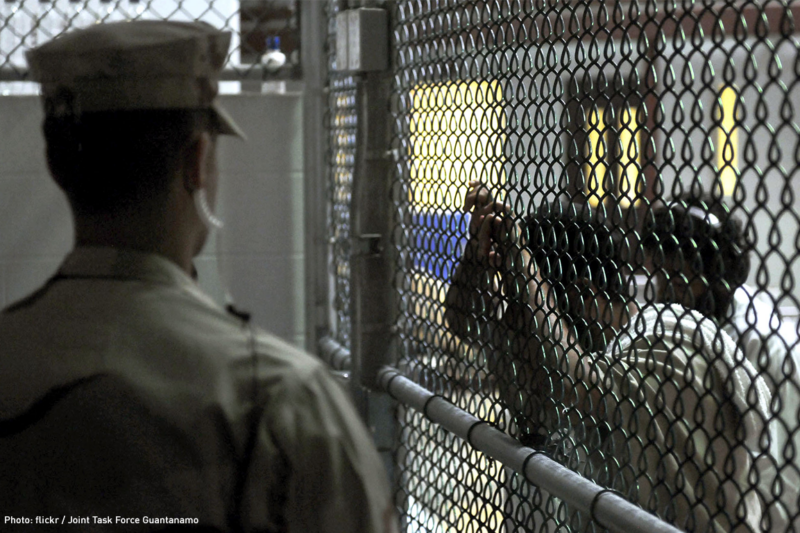
There has been much talk lately about the dangers of normalizing President Trumpâs extreme policy ideas and behavior. As a third presidential administration takes over GuantĂĄnamo, the idea that men will be imprisoned forever without charge or trial is also at risk of becoming ânormal.â That is something that we cannot let happen because it is completely at odds with the American values of justice, fairness, and the rule of law.
President Obama transferred 198 detainees out of GuantĂĄnamo and President Bush transferred out many more, 532 to be exact. There are now 41 men left, only 10 of whom have been charged with a crime. The rest are facing indefinite detention in the Trump administration â including five detainees who have already been cleared for release by a panel of national security officials.
Those who remain have been held without charge or trial for over a decade in a system of indefinite detention that allows the government to arrest and imprison people it lacks the evidence to prosecute â which is the opposite of what our Constitution stands for. Speaking about GuantĂĄnamo, Trump to âload it up,â and a might enable precisely that. But dropping individuals indefinitely into the black hole of GuantĂĄnamo instead of trying them in federal court doesnât make our country safer â it just gives recruiting propaganda to our enemies and continues to erode our commitment to human rights and justice.
A few days after the inauguration, I went to GuantĂĄnamo Bay for the continued pre-trial proceedings in the prosecution of the 9/11 defendants. Perhaps forgotten in the chaos of the last two weeks, the military commissions are continuing with their âbusiness as usualâ model â which is to say, an ongoing human rights disaster.
The military commission system that Trump has inherited is plagued by the same deep-rooted legal and ethical problems that these hearings have had since their inception: their secrecy, denial of due process rights, and the ability to hide evidence of torture â even when that evidence is also used against defendants. Indeed, chief among the reasons the military commissions were created was to keep illegal government torture secret.
But in a capital punishment case like the 9/11 prosecution, the secrecy surrounding evidence of torture and the lack of basic safeguards that are guaranteed under the Constitution is significantly more dangerous. The latest example came in the only hearing open to observers last week. After a medical emergency forced one of the capital defense attorneys to be absent from this session, Judge James Pohl decided that at least one part of the proceedings could go on in her absence.This is something that would never happen in federal court, where the constitutional right to qualified representation in a death penalty case is sacrosanct and where defense teams include more than one capital attorney. (The chief defense attorney for the military commissions has been asking for additional capital attorneys since 2015, without receiving a response.) The judgeâs decision illustrates just how tenuous the protections for defendants are in the military commissions â even when death is on the line.
Further, in a system where the prosecution is the gatekeeper of the evidence, the defense â and the American public â are forced to depend on the government to decide which evidence is âtoo secret,â what evidence is necessary for an effective defense, and whether evidence of torture will ever be introduced and made public. This structure is absolutely antithetical to fundamental fair trial standards. It also means that defense attorneys have limited access to the evidence they need to move forward with their case. For example, defense attorneys who want witnesses to appear must request it through the prosecution. The overwhelming majority of those requests have been denied.
As defense attorney James Connell recently, âWhat this case has demonstrated â if itâs demonstrated anything â is that torture makes criminal cases virtually impossible to prosecute. In fact, itâs fair to say that torture and due process are mutually exclusive.â
What is clear from the last decade of hearings is that this system, polluted with constitutional infirmities and the legacy of torture, is incapable of providing real justice to anyone, including the families of victims, the American public, and the defendants. And like the tribunals it hosts, the GuantĂĄnamo prison remains a devastating blot on our human rights record. We will keep fighting to close it and put an end to indefinite detention and this travesty of justice.

